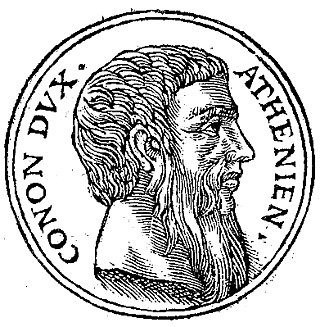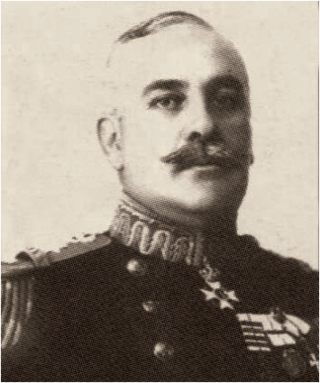Commodore is a senior naval rank used in many navies which is equivalent to brigadier or brigadier general and air commodore. It is superior to a navy captain, but below a rear admiral. It is either regarded as the most junior of the flag officers rank or may not hold the jurisdiction of a flag officer at all depending on the officer's appointment. Non-English-speaking nations commonly use the rank of flotilla admiral, counter admiral, or senior captain as an equivalent, although counter admiral may also correspond to rear admiral lower half abbreviated as RDML.

This article concerns the period 409 BC – 400 BC.

Lysander was a Spartan military and political leader. He destroyed the Athenian fleet at the Battle of Aegospotami in 405 BC, forcing Athens to capitulate and bringing the Peloponnesian War to an end. He then played a key role in Sparta's domination of Greece for the next decade until his death at the Battle of Haliartus.

Conon was an Athenian general at the end of the Peloponnesian War, who led the Athenian naval forces when they were defeated by a Peloponnesian fleet in the crucial Battle of Aegospotami; later he contributed significantly to the restoration of Athens' political and military power.
Admiral is one of the highest ranks in some navies. In the Commonwealth nations and the United States, a "full" admiral is equivalent to a "full" general in the army or the air force. Admiral is ranked above vice admiral and below admiral of the fleet, or fleet admiral.
Military ranks are a system of hierarchical relationships within armed forces, police, intelligence agencies and other institutions organized along military lines. Responsibility for personnel, equipment and missions grow with each advancement. The military rank system defines dominance, authority and responsibility within a military hierarchy. It incorporates the principles of exercising power and authority into the military chain of command—the succession of commanders superior to subordinates through which command is exercised. The military chain of command is an important component for organized collective action.
The Battle of Aegospotami was a naval confrontation that took place in 405 BC and was the last major battle of the Peloponnesian War. In the battle, a Spartan fleet under Lysander destroyed the Athenian navy. This effectively ended the war, since Athens could not import grain or communicate with its empire without control of the sea.

A polemarch was a senior military title in various ancient Greek city states (poleis). The title is derived from the words polemos (war) and archon and translates as "warleader" or "warlord". The name indicates that the polemarch's original function was to command the army; presumably the office was created to take over this function from the king. The title held a high position in Athenian society, alongside the archon eponymos and the archon basileus. In Athens the polemarch was the commander-in-chief of the armed forces of the city-state. In Modern Greek, polemarchos means warlord.
Commander is a common naval officer rank as well as a job title in many armies. Commander is also used as a rank or title in other formal organizations, including several police forces. In several countries, this naval rank is termed as a frigate captain.
Eurybiades was the Spartan navarch in charge of the Greek navy during the Second Persian invasion of Greece.
In the United States Navy, officers have various ranks. Equivalency between services is by pay grade. United States Navy commissioned officer ranks have two distinct sets of rank insignia: On dress uniform a series of stripes similar to Commonwealth naval ranks are worn; on service khaki, working uniforms, and special uniform situations, the rank insignia are identical to the equivalent rank in the US Marine Corps.
The Battle of Notium in 406 BC was a Spartan naval victory in the Peloponnesian War. Prior to the battle, the Athenian commander, Alcibiades, left his helmsman, Antiochus, in command of the Athenian fleet, which was blockading the Spartan fleet in Ephesus. In violation of his orders, Antiochus attempted to draw the Spartans into battle by tempting them with a small decoy force. His strategy backfired, and the Spartans under Lysander scored a small but symbolically significant victory over the Athenian fleet. This victory resulted in the downfall of Alcibiades, and established Lysander as a commander who could defeat the Athenians at sea.
A flag officer is a commissioned officer in a nation's armed forces senior enough to be entitled to fly a flag to mark the position from which that officer exercises command.

Warfare occurred throughout the history of Ancient Greece, from the Greek Dark Ages onward. The Greek 'Dark Ages' drew to an end as a significant increase in population allowed urbanized culture to be restored, which led to the rise of the city-states (Poleis). These developments ushered in the period of Archaic Greece. They also restored the capability of organized warfare between these Poleis. The fractious nature of Ancient Greek society seems to have made continuous conflict on this larger scale inevitable.
Callicratidas was a Spartan navarch during the Peloponnesian War. He belonged to the mothax class so he was not a Spartiate, despite his status he had risen to prominence. In 406 BC, he was sent to the Aegean to take command of the Spartan fleet from the navarch Lysander.

Classical Greece was a period of around 200 years in Ancient Greece, marked by much of the eastern Aegean and northern regions of Greek culture gaining increased autonomy from the Persian Empire; the peak flourishing of democratic Athens; the First and Second Peloponnesian Wars; the Spartan and then Theban hegemonies; and the expansion of Macedonia under Philip II. Much of the early defining mathematics, science, artistic thought, theatre, literature, philosophy, and politics of Western civilization derives from this period of Greek history, which had a powerful influence on the later Roman Empire. Part of the broader era of classical antiquity, the classical Greek era ended after Philip II's unification of most of the Greek world against the common enemy of the Persian Empire, which was conquered within 13 years during the wars of Alexander the Great, Philip's son.
Aracus was a Spartan military commander and statesman. He served as ephor in 409/8 BC, and seems to have been a supporter of the foreign policy championed by Lysander during the Peloponnesian War. In 406 BC, Aracus received the nominal command (navarchy) of the Spartan fleet, with Lysander as his secretary or deputy. Lysander held the actual command of the fleet, and had only been assigned a position subordinate to Aracus because Spartan law did not allow the same man to hold the office of navarch twice.

Ioannis Ipitis (1867-1956) was a Greek admiral and writer. He served as Chief of the General Staff of the Navy from 9 November 1920 to 26 April 1921.
The navarch was the magistrate who commanded the fleet in Ancient Sparta.








